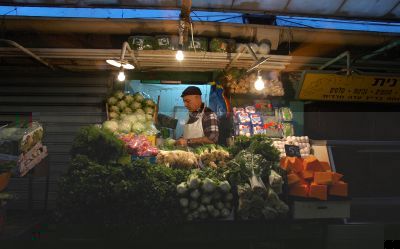Changing times give Jerusalem market new, old flavour

Your support helps us to tell the story
From reproductive rights to climate change to Big Tech, The Independent is on the ground when the story is developing. Whether it's investigating the financials of Elon Musk's pro-Trump PAC or producing our latest documentary, 'The A Word', which shines a light on the American women fighting for reproductive rights, we know how important it is to parse out the facts from the messaging.
At such a critical moment in US history, we need reporters on the ground. Your donation allows us to keep sending journalists to speak to both sides of the story.
The Independent is trusted by Americans across the entire political spectrum. And unlike many other quality news outlets, we choose not to lock Americans out of our reporting and analysis with paywalls. We believe quality journalism should be available to everyone, paid for by those who can afford it.
Your support makes all the difference.A sweet aroma wafts into the cold morning air as Eliran Shrefler cooks up the hearty soups and stews that have made his restaurant a legend in Mahne Yehuda market, itself a Jerusalem landmark.
Shrefler is just 28, but he has little time for the stylish eateries and pricey boutiques that now dot the bustling market, a venerable institution steeped in the past century's dramatic history of the Holy City.
"Do those who open restaurants or boutiques think they invented the market, as if there was no one here before them?"
His tiny family-run restaurant has resisted change since his father Azura, after whom it is named, founded it in the 1960s, and it continues to do brisk business with its hearty Mediterranean food.
In the wee hours of the morning, as merchants arrange their displays of fruit, vegetables, fish, meat or assorted wares, Shrefler sets his saucepans on primus stoves, where they will simmer for hours.
By 11 am, Azura is teeming with patrons who dig into the bubbly soups and stews, served generously by Eliran's brother, Chico.
Once the exclusive domain of stall-holders and neighbourhood locals, the unpretentious eatery attracts increasing numbers among the younger, wealthier and hipper crowds seen in the market these days.
Signs of the changing times can be seen throughout the maze of narrow streets that make up Mahne Yehuda, which is known to locals simply as the "Shuk" - Hebrew for market.
Fancy cheese and wine shops, trendy cafes, French-style bakeries, Asian groceries and designer boutiques account for an ever larger share of the market's business as the more traditional stores struggle to compete with the city's supermarkets and shopping malls.
"When I opened, half of the people said I was crazy, the other half said I was a genius," says Eli Mizrahi, who founded the market's first espresso bar eight years ago in a move that helped change the face of his childhood stomping grounds.
Just a few streets away from Azura, in a renovated building with stylish blue doors, is MahneYuda, a gourmet restaurant opened earlier this year by three young chefs that has become a national hit overnight.
"Business is crazy, simply crazy," says chef Asaf Granit.
The restaurant's menu is based on local products from the market, but also non-Kosher foods such as seafood and pork, a rarity in the overwhelmingly religious Holy City.
"The food here is not Kosher, but out of respect for the neighbourhood and the people living here, we don't open on Friday night and on Saturday. There is a kind of symbiosis here... I think it is a nice coexistence," he says.
By noon, the narrow, covered alleys of the market are abuzz with hundreds of shoppers, many of them elderly, ultra-Orthodox Jews, closely inspecting the produce as merchants try to outdo each other in praising the quality and low cost of their wares.
Unaffected by the chaotic lunchtime shopping scene is another landmark in the market's new image - Basher's cheese shop.
Founded 60 years ago as a family restaurant, the delicatessen today boasts the country's largest selection of cheeses from all over Europe and Israel and it draws a slew of well-heeled customers.
"The last years, were not like it used to be 20 years ago. The market today in culinary terms is at the highest levels in Israel and the world," says owner Eli Basher, handing customers thin slices of Swiss cheese.
But in a narrow, dark alley, unaffected by the market's renovation in the 1990s, merchants proclaim their indifference to the new fad.
"Youngsters no longer want to work. They just want quick, easy money," says 82-year-old Pinhas Mitzva, who started working here 52 years ago after immigrating from Iran, where he also worked in a market.
Mitzva still shows up every morning on his electric wheelchair to run a rickety stand laden with notions and small housewares on the corner of the section locally known as the Georgian market.
"I love coming here. It is my life. Besides, if I stayed at home all day I would get into trouble with my wife," he says, bursting into laughter.
Join our commenting forum
Join thought-provoking conversations, follow other Independent readers and see their replies
Comments